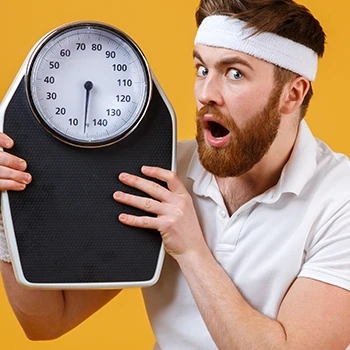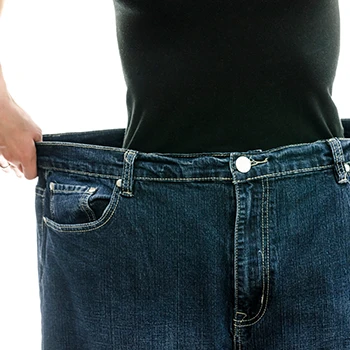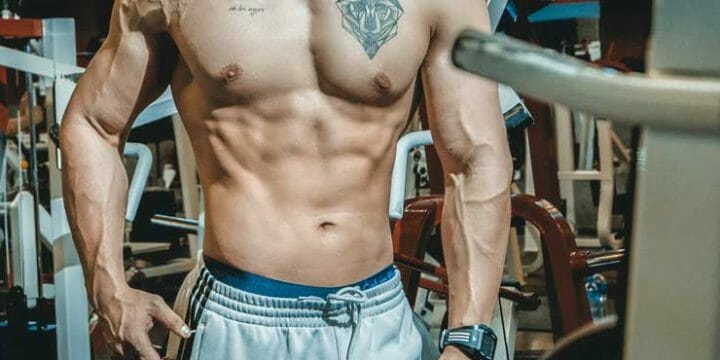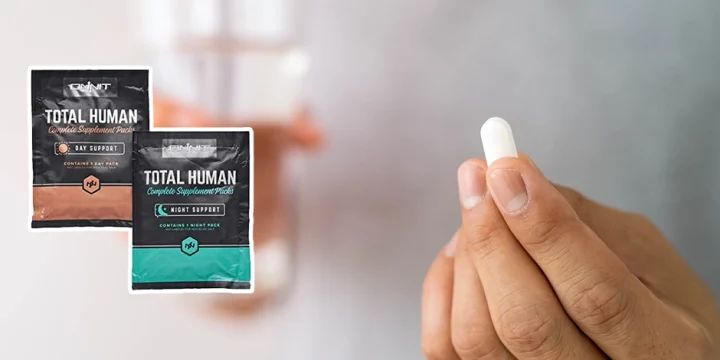In my experience as a fitness trainer over the last decade, I’ve often heard clients use the terms “fat loss” and “weight loss” interchangeably. While they’re not wrong, those terms technically don’t mean the same thing.
Colloquially, they both refer to losing body fat. But technically speaking, losing fat and losing weight are two different things, and some of the differences are vital.
I used my experience, consulted other fitness experts, and checked what scientific research has to say to give you the best and simplest explanation, so let’s get into it.
Quick Summary
- Body fat loss refers to only losing fat, differentiating from general weight loss which may include water, muscle, or bone mass loss.
- Accurate measurement of fat loss can be achieved using methods like skinfold tests, body fat scales, and tape measures, rather than relying solely on body weight.
- A high-protein diet has been shown to lead to greater muscle mass retention and fat loss, especially in individuals over 50, according to a review of 20 studies.
- In my experience, prioritizing fat loss over weight loss is essential for long-term health and fitness, as it focuses on improving body composition and metabolic health.
Weight Loss vs Fat Loss: Key Differences
In my training sessions, I've seen weight loss often include water and muscle loss, not just fat. It's a key distinction I make sure my clients understand.
Weight loss can be a result of:
- Losing water weight
- Losing fat
- Reduction in muscle
- Loss of bone mass

On the other hand, fat loss refers to a drop in your fat levels only. It’s usually measured as a percentile called body fat percentage.
Both fat loss and weight loss can be achieved through diet and exercise.
Although, most times, people lose (and prefer to lose) body fat over body weight.
Another significant difference between weight loss and fat loss has to do with fitness goals. For example, if you want to drop body fat and reveal muscular definition, then you want to achieve fat loss.
How Is Fat Loss Measured?
Fat loss can be measured using a skinfold test, body fat scale, tape measure, and by calculating body mass index. You can check here about the ideal body fat percentage.
- Skin Fold Test: This is one of the most accurate ways to measure your body composition. This test employs the use of skinfold calipers to help you get an estimate of your fat percentage. However, according to a PubMed study, it takes a bit of practice before getting accurate results [1].
- Body Fat Scale: Body fat scales measure your fat levels by running a very small amount of electric current through your body. However, they’re not known for being the most accurate.
- Tape Measure: This is a more straightforward form of measuring how much fat you’ve lost. All you need to do is measure different parts of your body with a tape measure. The measurements are calculated in different ways to measure body fat.
- BMI (Body Mass Index): This is a measure of body fat based on your height and weight. It's calculated as your body mass divided by the square of your height (kg/m2).
Related article: How Much Body Fat Can You Lose in a Week?
3 Tip How to Lose Fat and Maintain Muscle

I always emphasize to my clients: aim for fat loss with muscle retention for a healthier transformation.
Here are some effective ways of doing it based on what’s worked best for my clients.
1. Eat a High Protein Diet
From my experience, a high-protein diet is key for my clients' muscle repair and energy levels during fat loss phases.
Your body uses protein to build and repair body tissue, maintain fluid balance, create hormones and enzymes, boost immunity, and produce energy [2].
“Diets with increased protein can have a positive effect on the treatment and prevention of type 2 diabetes and metabolic syndrome, and possibly even heart disease.”
- Dr. Bret Scher, MD, Board-Certified Cardiologist and Lipidologist
A review of 20 studies published in the National Library of Medicine, on men and women above the age of 50 found that a high-protein diet (0.68 grams per kilo of lean body weight) led to greater muscle mass retention and fat loss than a low-protein diet [3].
Young and more physically active people need to consume 0.7 to 1 gram of protein per pound of body weight to maintain their muscle mass [4].
So, if you weigh 180 pounds and want to keep your muscle, you’ll have to consume 126 to 180 grams of protein a day. If you can't take this amount with a regular diet, you can also try protein shakes which are great for weight loss.
Another plus point about protein is that it’s very satiating compared to other kinds of foods [5], so it can keep you from consuming unnecessary calories.
2. Exercise Regularly

When it comes to exercise, strength training, and resistance training are some of the best ways to gain muscle and lose excess fat mass [6].
However, stick to basic exercises if you're looking to significantly build muscle and only want to maintain what you currently have.
In my experience, exercises like push-ups, dips, pull-ups, squats, lunges, split squats, leg raises, and other bodyweight exercises are an excellent way to maintain your current muscle.
The main idea is that you need to stay physically active to avoid muscle atrophy, which can decrease your overall lean weight [7].
Regular exercise also helps lose weight, preserve muscle mass, and lose body fat. Cardiovascular activities such as running, cycling, or swimming can increase calorie expenditure and promote fat burning.
Combining cardiovascular exercises with strength training creates a well-rounded fitness routine that targets muscle building and fat loss.
3. Get Enough Sleep and Recovery
A 2017 study found that poor sleep quality and shorter sleep duration were associated with an increased risk of muscle reduction and strength [8].
Recovery also plays a crucial role in maintaining muscle and strength. I’ve seen clients go against my workout plans and push themselves on rest days.
While this may work for more athletic folks, it’s counterintuitive for the average person looking to lose weight. The result is that many of them end up losing lean body mass [9].
There are also supplements called nighttime fat burners which boost fat burn during your sleep even more.
When it comes to sleep and recovery, nutrition also plays a crucial role.
Protein provides the building blocks necessary for muscle repair and growth. Including lean protein sources, such as chicken, fish, tofu, or beans, in your meals and snacks, can help promote muscle recovery and maintenance.
Additionally, staying hydrated and consuming a balanced diet rich in fruits, vegetables, and healthy fats can further support your body's recovery process.
“Recovery days are important for rehydration, nutrient replenishment, sleep, and muscle repair and growth.”
- Dr. John McDonald, MD, Sports Medicine Specialist
Dangers of Losing Too Much Fat and Weight

A healthy rate of fat loss is around 1 to 3 pounds per week. I've seen cases where pushing beyond this limit led to issues like lowered metabolism, nutritional deficiencies, and even muscle loss [10] [11].
Serena Benali, registered dietitian and founder of In Good Nutrition, says that losing a significant amount of weight at a rapid pace could mean you are in a long-term calorie deficit.
The body then responds to this by lowering metabolic rate to conserve energy, making it harder to lose weight and easier to regain weight in the future.
Michael Hamlin, personal trainer and founder of Everflex Fitness, adds that tracking weight loss with the help of a scale can be challenging as our body weight swings up and down on a daily basis up to 5 or 6 pounds per day for most people.
You need to ensure that you consume fewer calories than you expend and manage your calorie intake so as to give your body the fuel it needs to recover.
Trying to lose weight and minimize muscle loss can be a grueling task for some people. In such cases, fat burners can give you that extra boost you need to burn away any stubborn fat.
Hormonal Changes During Fat Loss vs. Weight Loss
Here's how fat loss can influence your hormonal balance:
- Leptin and ghrelin: Fat loss, particularly when achieved through a balanced diet and exercise, can lead to improved regulation of leptin and ghrelin - hormones responsible for hunger and satiety signals. Reduced body fat often results in better leptin sensitivity, helping you feel more satisfied after meals.
- Insulin sensitivity: Decreasing body fat, especially visceral fat, enhances insulin sensitivity. This improvement is crucial for metabolic health, reducing the risk of type 2 diabetes and other metabolic disorders.
- Cortisol levels: Unlike rapid weight loss, which can spike stress hormone (cortisol) levels, gradual fat loss can help maintain more stable cortisol levels, reducing the risk of stress-related eating and fat accumulation, particularly in the abdominal area.
In contrast, rapid weight loss, especially when it involves muscle loss, can disrupt hormonal balance:
- Thyroid function: Rapid weight loss can sometimes lead to a decrease in thyroid hormone production, slowing down metabolism.
- Reproductive hormones: For both men and women, excessive weight loss can impact reproductive hormones, leading to irregularities in menstrual cycles in women and reduced testosterone levels in men.
Related articles:
FAQs
Where Does the Body Lose Fat First?
The body first loses fat around the organs. This fat is called visceral fat (or hard fat) and surrounds your kidney, liver, and other organs.
What Part of the Body Loses Fat the Fastest?
The belly and lower body tend to lose fat the fastest. In men, it’s the former, whereas, in women, it’s the latter.
Why Do I Look Thinner But Weigh More?
You look thinner but weigh more because you possibly have more muscle than fat. A pound of muscle occupies 22% less space than a pound of fat but weighs more.
How Do I Know If I’ve Gained Water Weight?
You know you’ve gained water weight when you weigh more, but your fat percentage is the same, all within a short span of time.
References:
- https://pubmed.ncbi.nlm.nih.gov/20040894/
- https://www.lsuagcenter.com/topics/food_health/education_resources/eatsmart/lessons/protein-lesson-4
- https://www.ncbi.nlm.nih.gov/pmc/articles/PMC4892287/
- https://www.ncbi.nlm.nih.gov/pubmed/29497353
- https://www.webmd.com/diet/default.htm
- https://www.ncbi.nlm.nih.gov/pmc/articles/PMC6950543/
- https://www.medicalnewstoday.com/articles/325316
- https://www.ncbi.nlm.nih.gov/pmc/articles/PMC5749041/
- https://www.medicalnewstoday.com/articles/rest-day
- https://www.ncbi.nlm.nih.gov/pmc/articles/PMC4989512/
- https://onlinelibrary.wiley.com/doi/full/10.1002/oby.21346
About The Author
You May Also Like






